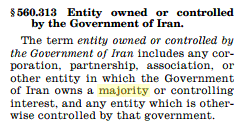
A report from the Associated Press suggests that private military and security companies providing protection to commercial shipping in pirate-infested waters have come up with a novel way of arming themselves without running into import and export restrictions of countries where they may dock their vessels in between missions:
Private security firms are storing their guns aboard floating armories in international waters so ships that want armed anti-piracy guards for East Africa’s pirate-infested waters can cut costs and circumvent laws limiting the import and export of weapons, industry officials say.
Companies and legal experts say the operation of the armories is a “legal gray area” because few, if any, governments have laws governing the practice. Some security companies have simply not informed the governments of the flag their ship is flying, industry officials said. …
Storing guns on boats offshore really took off as a business last year. Britain — where many of the operators are from — is investigating the legality of the practice, which has received little publicity outside of shipping industry circles.
Floating armories have become a viable business in the wake of increased security practices by the maritime industry, which has struggled for years to combat attacks by Somali pirates.
The story suggests that there are ten to twelve such armories and that their existence is spurred by complex, ever-changing, and prohibitive laws on the import and export of weapons into ports of the countries in the region around Somalia, such as Saudi Arabia, Egypt and Yemen. The floating armories are governed instead by the laws of the country that flags the vessel, with many of the armories apparently flying the flag of the land-locked nation of Mongolia.
The demand for armed guards is understandable given that without them ships are forced to rely on high pressure water hoses to rebuff attacks by Somali pirate skiffs. Surprisingly, such defensive measures have at times proven successful against some of the less competent Somali pirates.

 Posted by
Posted by  Category:
Category: 

 Well, even the White House now knows, and presumably the folks at the Office of Foreign Assets Control now know, that the Syrian dictator with the silly moustache, Bashar al-Assad, was possibly circumventing U.S. sanctions when he
Well, even the White House now knows, and presumably the folks at the Office of Foreign Assets Control now know, that the Syrian dictator with the silly moustache, Bashar al-Assad, was possibly circumventing U.S. sanctions when he 
 So, this afternoon, I was on the phone with a client who had a question about the Cuba sanctions enforced by the Office of Foreign Assets Control (“OFAC”). As I often do in these situations, I went to the OFAC site to pull up the Cuban sanctions regulations themselves and, poof, they were gone. The hyperlink on
So, this afternoon, I was on the phone with a client who had a question about the Cuba sanctions enforced by the Office of Foreign Assets Control (“OFAC”). As I often do in these situations, I went to the OFAC site to pull up the Cuban sanctions regulations themselves and, poof, they were gone. The hyperlink on 
 An Afton, Wyoming man, Matt Kallgren, was
An Afton, Wyoming man, Matt Kallgren, was 

